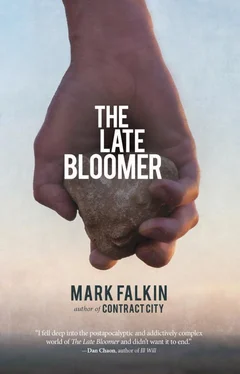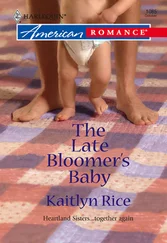“It’s going to be important to you. And our common vision lends to that knowledge.”
I swung and didn’t say anything. She looked at the speckles of blood on her hand. She smeared it into her other hand. At the apex of my swings behind her, I could see that her shoulders were lifting and shaking as she began to cry.
I drag-stopped. “Come on. Let’s go in and take your temp.”
Kodie’s temperature measured 102. She lay prone on the couch in the living room, her forearm resting on her forehead, her eyes closed.
“Shit,” she said.
No, that’s good , I thought. Fever means the body fights something from with out , that invaded and spreads.
Bass made coffee, moving about shirtless in the kitchen. He sniffed a lot, rubbed his palms under his armpits and massaged his pecs in a vain way he would do even if alone. “Warsteiner,” he said with morning-after vocal fry.
I sat at the long white subway-tiled kitchen bar, waiting on the coffee.
“What’s wrong with her?” Bass asked me, keeping his voice low.
“Why don’t you ask her?” I gave him a look which said, I saw you eyeing her last night .
He coughed into a fist. “Because she looks like she doesn’t feel like talking.”
“Got a fever. Been coughing up blood.”
“Blood?”
“Bass, when you saw your folks… Sorry, man, I’ve got to ask this. Was there any?”
The coffeemaker hissed. “Blood. Cracking lips, but not from the throat. The whole thing seemed very dry. If that makes sense.” He looked off into the corner of the kitchen, his arms crossed and his palms under his armpits. It was that same glazed stare seen in the faces in the photographs of soldiers from the front staring off for a thousand yards. This all happened only twenty-four hours ago yet it seemed ages.
After several minutes of silence as Bass and I drank our coffee, prefaced by a deep sigh which triggered a coughing jag, Kodie said, “I don’t know what to do.” Her forearm still rested over her eyes.
Nobody said anything for a minute or so, which, following that question, was a long time indeed.
“What do we do?” she asked. “This malaise. Shouldn’t we be freaking out?”
I said, “Maybe our survival demands that we don’t do that. We’re in shock, like when you break a bone and it doesn’t hurt so bad at first. If we were to drive around all half-cocked, it’d be dangerous. Maybe this mellowness, not panicking, is part of it.” My pontificating felt as strange as my defense of this course of inaction.
Bass grabbed his wadded dark green T-shirt from the counter, pulled it on, and asked, “What do you want to do about Johnny, Kevin? I’m up for whatever you want to do about it. If you want to go try to find him, I’m with you.”
Heavy, helpless sigh from me. “I mean, where would we start? Johnny’s with all the others. He came back before. But that Simon kid, though, what he said.”
“The boy you talked to at the cemetery? What’d he say? You didn’t tell me.” Kodie started to sit up but didn’t.
“He said to keep Johnny with us. Like it mattered in some big way. And he said that the kids were really scared. They think there’s some monster—”
“—Beast,” reminded Bass, his lips to his mug so that the word came out muffled, steamed and amplified.
“—beast, out there that needs to be fed or it will get them. Feeding this beast is what will bring on what he called the beginning.”
Kodie sat up. She took the thermometer from the coffee table and stuck it under her tongue, clicking it against her teeth. We waited for the beeper to go off. “There. It’s going down. I took something before you got home. I feel better.”
“You took something?” I asked
“In your cabinet. Ibuprofen.” Why hadn’t she mentioned it?
“I think we need to go find where they all are,” Bass said. “Johnny’ll be with them. There’s a hundred thousand kids out there in this city that we can’t see or communicate with. That’s the first step.”
“All right,” I said, up for anybody else to take the lead. My four a.m. train-chasing fatigue burrowed into my bones. “Let’s get a ham radio somewhere. Maybe, just maybe, there’s somebody out there.” We all nodded.
“Walkie talkies,” Kodie said. We all nodded.
“Don’t cost nothin’,” Bass said.
“Sounds like the beginnings of a plan are forming here. The malaise lifts,” I said, smiling. “Kodie, you up for this?”
“I have a choice? I mean, we shouldn’t go out alone or be left alone and we need to make some moves now. Before long the power’s going to go. Yeah, I’ll be okay.”
The rumbling motor and rattling exhaust echoed between my street’s halt houses. “We could just go get another car. A brand-new truck or something,” Bass said.
“An urban assault vehicle.”
“There you go. Like a Suburban. No, a Hummer.”
“Hummer. Yes.”
“How Green Zone of you,” said Kodie from the back seat, still offering her old-world protests.
“Let’s go find out where these kids are first,” Bass said.
“Where to? I mean, where in the hell do we start?” I asked.
“Let’s cruise around, see what we can see.”
“I know it sounds silly, but it’s kids we’re talking about, right? So, the schools, the malls.”
Bass demurred. “Huh-uh. Zilker. Butler.”
Kodie chimed in. “What we were talking about earlier, Kevin. That’s where I think I’ve been seeing them. Down by the river.”
I nodded and looked back at her. “Yeah. And if you’re a kid, would you want to go back to school if nobody made you?”
“Hold on,” Bass said. He put the Bronco into park and chugged in the middle of the street. “You’ve been seeing them? What are you guys talking about?”
Kodie and I sat in silence, each waiting for the other to say.
“Okay. Don’t answer me.” He started to put the truck in gear.
“Poor Bastian,” Kodie mocked. The flirty way she said it stung. “Tell you what. When we’re all done, we’ll go get you a nice new Humvee with a machine gun turret on top. That make it all better?”
Bass nodded childishly, bowed his head but lifted his beseeching eyes to her. “And ice cweam?”
“And ice cweam,” I said, stepping on Kodie’s next line to quash their rapport.
“Guys, shut up,” Kodie said. She toggled her eyes in her head. “I know you don’t care, Kevin, and I understand, but I’ve got to try to find my folks. I can’t just not try.”
Bass nodded. “Let me know where you want to start.”
“My house,” she said. “Hyde Park.”
We started to roll when I noticed the door cracked at the Fleming’s house. The door swung back and forth, an inch out, an inch in. “Hold on a sec,” I said, “I gotta see something real quick.”
“Real quick,” admonished Bass.
I hopped out of the truck and jogged over to the Flemings’ house, stepping around the cairn of stones covering Becky Fleming. I noticed the smell, the rank and the sweet marking the decay. Approaching the door, the smell shifted, then grew.
“There’s no reason in the world why I’ve got to go in here,” I told myself just before I pushed open the door with my toe. “Yet here I am,” I said with my hand over my nose and mouth. The sound the door made creaking open came from somebody pressing play on a spooky sounds CD from the ninety-nine-cent post-Halloween cutout bin. I stepped in, left the door open behind me. I looked back at Bass and Kodie. They faced each other talking, and though distant and obscured, I could make out their bodily attitudes and I burned. They seemed to be arguing.
In the back part of the house, I heard tinny music Mr. Fleming had left on. Leaves had blown in. They scratched underfoot. I walked through the stillness, the wood floors similar to ours creaking under my footfalls. Tiptoed down the gloom of the hallway as if I were sneaking up. The smell intensified. The blinds and curtains of the house were still drawn as they would be at early morning, so by the time I reached the hallway to the bedrooms, I had to flip on the light. The wash of light bared out everything true and awful though I looked only at a plain hallway. Pictures on the wall.
Читать дальше












